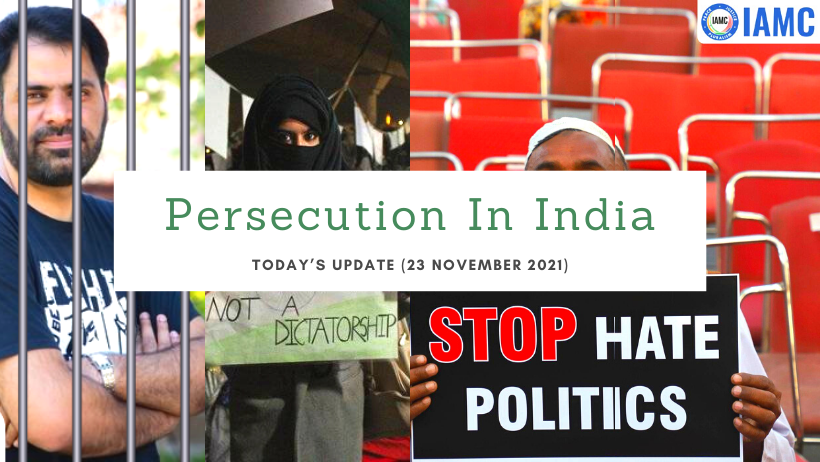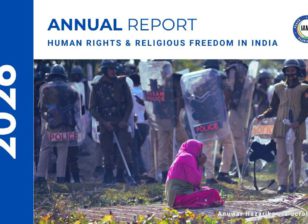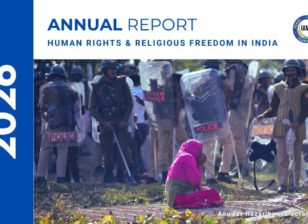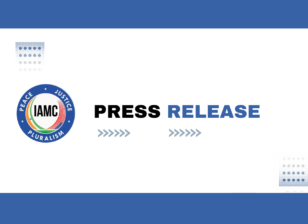India Arrests Renowned Kashmiri Rights Activist Under Anti-Terror Law; UN Official, Rights Groups Condemn Arrest
Khurram Parvez, a globally renowned veteran peace and rights activist in Kashmir, was arrested by Indian agencies on November 23 on criminal charges under an anti-terror law. This law, the Unlawful Activities (Prevention) Act (UAPA), has been challenged at India’s Supreme Court for being draconian, over-broad and mostly abused by the government to target religious minorities, critics and human rights defenders.
The arrest was made by the National Investigative Agency (NIA), which has been accused of anti-Muslim bias. The bulk of its criminal investigation and prosecution targets Indian Muslims. The NIA arrests Parvez after searching his residence and office. The UAPA allows for detention of up to six months without trial.
UN Special Rapporteur on Human Rights Defenders Mary Lawlor called Parvez’s arrest “disturbing” and added in a tweet: “He’s not a terrorist, he’s a human rights defender.” Parvez heads Jammu Kashmir Coalition of Civil Society, a group of rights organizations. He was arrested and detained on similar charges in 2016, after being prevented from boarding a flight to attend a UN human rights forum in Geneva. He was eventually released without being convicted of any crime.
The Indian American Muslim Council (IAMC) condemns Parvez’s arrest as this action is part of Indian Prime Minister Narendra Modi’s continued anti-democratic crackdown on the eight million Muslims of Kashmir.
One In Three Muslims In India Face Discrimination At Hospitals Due To Their Faith
About 33% of Muslims in India say they have experienced discrimination on the basis of their religion in hospitals, a survey by NGO Oxfam India has found. Nearly, 4000 people from India’s 28 states and five Union Territories took part in the survey, the findings of which were released on November 23.
This share of Muslims who met with discrimination is higher than 22% of Scheduled Tribes, 21% of the Scheduled Castes (Dalis) and 15% from Other Backward Classes who reported discrimination at hospitals. The survey sought to assess the extent to which the Charter of Patients’ Rights, prepared by the National Human Rights Commission in 2018, was being implemented. Data for the survey was collected from February to April 2021.
Anjela Taneja, Inequality, Health and Education lead at Oxfam India, said the campaigns targeting Muslims after the Muslim sect Tablighi Jamaat’s congregation was held in the early days of the Covid-19 pandemic in New Delhi. “A particular community was vilified at the time, which was grossly unfair.”
The Tablighi Jamaat congregation was blamed for thousands of coronavirus infections around the country in the initial weeks of the lockdown in March 2020. The event had renewed stigma against Muslims, triggering a wave of business boycotts and hate speech.
India Shows Sharpest Rise In Democratic Violations During Covid: International Report
The sharpest rise in democratic violations in the world during the period of the Covid-19 pandemic has been seen in India, according to a report released by the International Institute for Democracy and Electoral Assistance (IDEA) on November 22. Such violations included harassment, arrests and prosecution of human rights activists, journalists, students, academics and those critical of the government and its policies, excessive use of force to enforce Covid-19 regulation, harassment of Muslim minorities and internet shutdowns and lockdowns, especially in Kashmir, the report said.
The report defined “democratic backsliding” as the “sustained and deliberate process of subversion of basic democratic tenets by political actors and governments. The report, titled Global State of Democracy 2021, said that the number of countries where “democratic backsliding” happened and the nations that were moving towards authoritarianism in 2020, was higher than those heading towards democracy.
The report also said that India imposed the highest number of internet shutdowns last year. Another report, released by digital rights and privacy organisation Access Now in March had also noted that last year, India had the highest number of internet shutdowns – 109 out of the total 155 globally.




